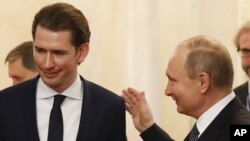Russian President Vladimir Putin is traveling to Austria on Tuesday on his first foreign trip since being sworn in for a fourth term in office last month. The visit, which marks the 50th anniversary of the start of Soviet gas deliveries to Austria, takes him to one of Europe's more Russia-friendly countries at a time when relations between the European Union and Russia are at a low ebb. It's his sixth official visit to Vienna.
East-West Bridge
Austria, unlike many other countries in the 28-nation EU, didn't expel Russian diplomats over the poisoning in Britain earlier this year of former Russian spy Sergei Skripal.
Chancellor Sebastian Kurz in March pointed to Vienna's "traditionally good contacts" with Russia and said his government would use them to press Moscow to help clarify the nerve agent attack. He said Vienna was "of the opinion that it is important to maintain channels of dialogue."
That reflects widespread thinking in Austria, going back well before Kurz's current center-right government — Putin's last visit, in mid-2014, was one of his first to the West after Russia's annexation of Crimea from Ukraine.
Traditionally neutral Austria, which hosts U.N. agencies including the International Atomic Energy Agency, is not a member of NATO. Russian Ambassador Dmitry Lyubinsky recently told the Austria Press Agency that Russia appreciates "Austria's responsible position on questions of the international agenda."
Political friends
Putin will meet liberal President Alexander Van der Bellen as well as Kurz, a 31-year-old conservative who became chancellor in December at the head of a coalition with the far-right Freedom Party. That party's leader, Vice Chancellor Heinz-Christian Strache, says he also will meet Putin.
The anti-migration and traditionally euroskeptic Freedom Party has long taken a positive view of the Russian leader, with Strache and other leaders traveling to Moscow in December 2016 to sign a cooperation agreement with the main Kremlin party, United Russia.
Business ties
Austria was the first western European country to sign a gas delivery agreement with the Soviet Union, on June 1, 1968, and Putin's visit this week coincides with that anniversary.
Today, gas and oil account for four-fifths of Russian exports to Austria, while Austrian exports to Russia include machinery and pharmaceuticals.Putin's last visit to Austria, in 2014, centered on the signing of an agreement between Austrian energy company OMV and Russia's Gazprom to build the Austrian section of the planned South Stream pipeline, a project that was later scrapped.
OMV is now among European companies involved in the planned Nord Stream 2 pipeline that would double the amount of gas Russia can send directly to Germany, skirting transit countries such as Ukraine — a project opposed by the U.S. and some other EU members.
Questioning sanctions
Austrian exports to Russia declined sharply after EU sanctions in 2014 were met by Russian sanctions.
In an interview with Sunday's edition of the Oesterreich newspaper, Strache said that "a rethink by the EU would be desirable, because the sanctions have above all damaged our Austrian economy." He added that it was time to end the "tiresome sanctions and normalize political and economic relations with Russia."
Austria will take over the EU's rotating presidency for six months in July, but there's little expectation of sanctions being lifted soon given that a peace plan for Ukraine is still far from completely implemented.




